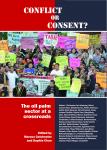13 Dec 2013
This is the twelth chapter of 'Conflict or Consent? The oil palm sector at a crossroads'.Introduction:Sime Darby’s oil palm and rubber concession in Grand Cape Mount county in northwest Liberia has come under sharp national and international focus after a complaint was submitted under the RSPO New Plantings Procedure (NPP) in November 2011. The complaint, submitted by communities affected by the concession, claimed that their Free, Prior and Informed Consent (FPIC) had not been sought, and that the destruction of their farmlands by the company in order to plant palm oil was leaving them destitute. Sime Darby’s concession also includes land in the neighbouring counties of Bomi, Gbarpolu and Bong.This case study, based on field research conducted in February 2012, assesses the nature and extent of community involvement in the acquisition of land for Sime Darby’s concession in Grand Cape Mount, in particular with regard to whether the right to Free, Prior and Informed Consent was respected.1 See page 315 for Sime Darby’s own map of the new plantings area and affected towns in Grand Cape Mount county.









